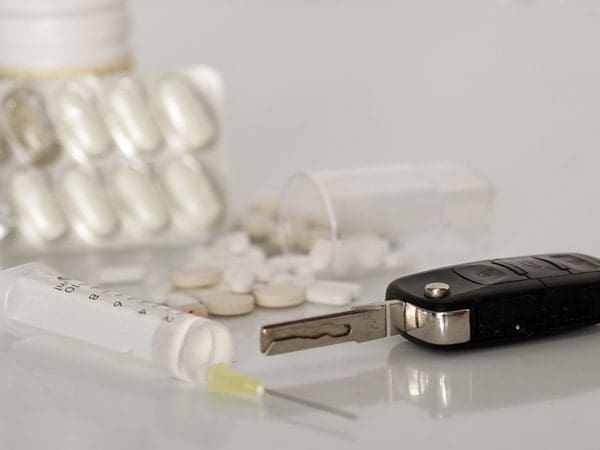 Drug abuse (using illicit drugs or misusing prescription drugs) can impair the user’s ability to drive.
Drug abuse (using illicit drugs or misusing prescription drugs) can impair the user’s ability to drive.
It’s a similar situation to getting behind the wheel after drinking, and it puts the occupants of the vehicle, others on the road, and pedestrians at risk. The driver can be charged with DUI (Driving Under the Influence of Alcohol or a Drug) or DWI (Driving While Intoxicated), depending on the state and the driver’s age.
Dangers of Drugged Driving
Drugged driving is dangerous because of the effects these chemicals have on the brain.
For example:
- Cocaine or methamphetamine use can lead to aggression or recklessness when
driving. - Benzodiazepines cause dizziness and drowsiness. Drivers who use these types of
sedatives may find it difficult to focus on the road. - Marijuana has the effect of impairing judgment of time and distance, slowing a driver’s
reaction time and impeding coordination. When alcohol and marijuana are used
together, drivers have even more difficulty paying attention to the road. They are more
likely to weave from one lane to another in this situation. - Certain prescription drugs can cause drowsiness, either on their own or in
combination with over-the-counter (OTC) preparations.
Drugged Driving is a Complicated Issue
There are several reasons why DUIs are more complicated than drinking and driving.
- Multiple substances are known to impair drivers.
- Some of the impairment-causing drugs are illicit (illegal), while others are legal to use
when prescribed by a doctor. Others are legal and available over-the-counter. - In many instances, the effect of a particular drug on a person’s ability to drive varies
from driver to driver. - During a roadside stop, police find it much more challenging to detect whether a driver
is under the influence of a drug than if the driver had been drinking alcohol. - DUI laws for drugged driving vary, depending on the state.
Drugged Driving Facts and Statistics
The following information was collected from the National Survey on Drug Use and
Health (2014).
- When asked whether they had driven while under the influence of illicit drugs during
the past 12 months, 10.1 million people aged 16 and older answered, “Yes.” - A total of 5.9 percent of respondents said they had used both alcohol and illicit drugs before driving.
- The numbers for people who reported driving under the influence increased with age,
peaking in the late teens and early twenties. By age 26, the number of people who
reported using illicit drugs and driving had decreased significantly. - Men were more likely than women to report having used illicit drugs and then driving.
Prescription Drugs and Drugged Driving
DUI laws only look at whether a driver is impaired enough that they cannot operate a
vehicle safely. A person using prescription drugs can be arrested for DUI when they
haven’t taken any illicit drugs at all.
Opioid pain medications like OxyContin, morphine, Vicodin, and Dilaudid may cause drowsiness and dizziness. Some people may experience nausea and vomiting when taking these types of medications.
Adderall and Ritalin, which are stimulants, can cause similar effects when they wear off. The person taking these medications can feel fatigued and have difficulty focusing on the road.
When these types of prescription medications are not being used as directed, their side effects become even more pronounced. Someone who is taking the medication more often than directed by a doctor or at a higher dose than prescribed may experience more severe side effects. They are putting themselves and others at higher risk for being involved in an accident.
DUI and Drug Abuse: A Wake-up Call to Get Professional Help
For some people, it takes a crisis event, such as being stopped by the police and charged with a DUI, to break through their denial about the severity of their substance abuse. This is not something that someone can either ignore or explain away. If you or a loved one are in this situation, consult with an experienced attorney.
If you suspect or know that you have been impaired by drug use while driving, consider consulting with an addiction treatment facility. Great Oaks Recovery Center offers caring, compassionate addiction treatment services focusing on helping clients achieve long-term recovery.
If you or someone you love is in need of alcohol or drug treatment, contact us anytime at (713) 769-0102. We are here to help.
Sources:
DUI/DWI. Nolo.


